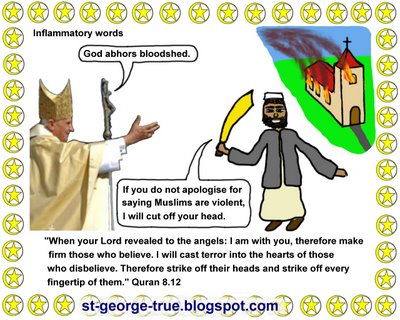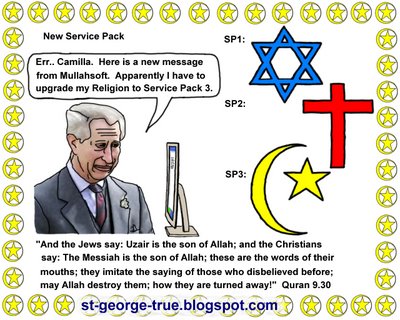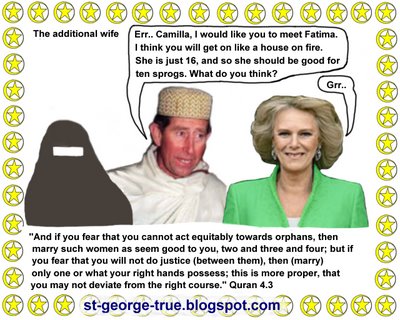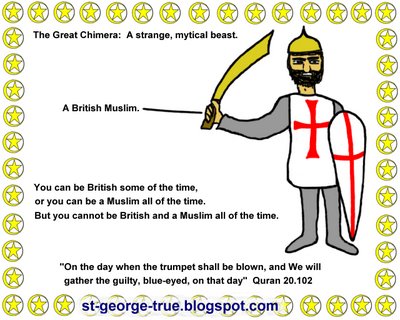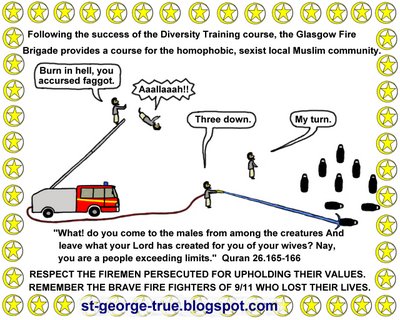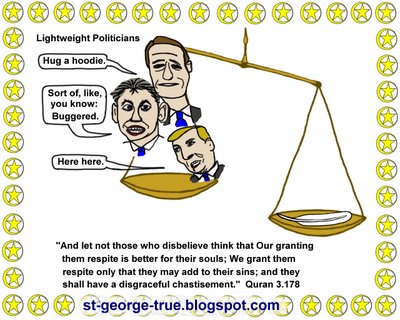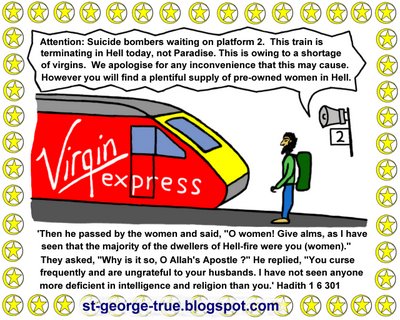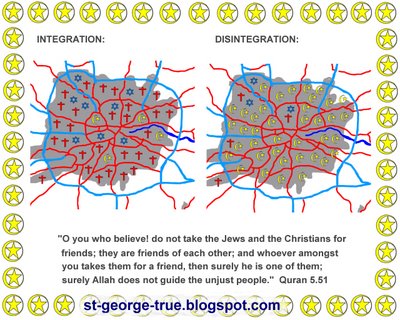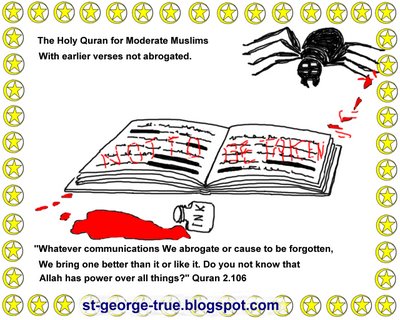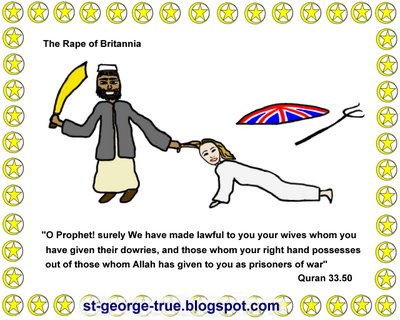Address given by Lord Carey of Clifton (former Archbishop of Canterbury) at the Gregorian University, Rome, on Thursday, March 25 2004 in which he criticised Islamic culture and regimes
Christianity and Islam: Collison or convergence?
I would like to begin this lecture by thanking Dr Eugene McCarthy for the privilege of being a McCarthy Visiting Professor this year at the Gregorian University. I have enjoyed the experience immensely and am grateful to the Dean, Dr. Franco Imoda, for his kindness and Fr.Bill Henn for his considerable helpfulness in so many ways.
We have been housed in a delightful cottage at the Irish College and I do want to express our gratitude also to the Dean, the staff and students of the College for way they have welcomed us so warmly. It is a great example of Irish/English relationships at their best!
The theme of my course at the Gregorian has been 'Unity and Mission'. My desire to offer a lecture on Christian-Muslim relations tonight has not only been fired by the course I have given, but also because for the last ten years or so it has been an important strand in my ministry as a Christian leader.
I need to make it plain, however, that I am not, in a technical sense, an expert on Islam or someone who is a
specialist in one of its disciplines. What I can claim is that for many years I have spent a great deal of time with some of the most important names in Islam – Dr Tantawi, Hassan al-Turabi, King Hussein, Prince Hassan, King Abdullah, Professor Akbar Ahmed and many other Muslim leaders and scholars – seeking to build bridges of understanding between two great faiths.
In retirement I continue to engage in dialogue through the Alexander Declaration Process which attempts to bring Muslim, Jewish and Christian leaders together in Israel and Palestine.
A second project I am involved in is a business driven initiative founded by the World Economic Forum. Together with Prince Turki of Saudi Arabia, I co-Chair the Council of 100 leaders from different professions and disciplines which has, as its aim, to strengthen links between the West and Islam.
My wife and I have also been to many Muslim countries and appreciate the strength and depth of Islam. I think I can say with some confidence that I have a reasonable idea of the challenges that Islam presents to Christianity and the West and the challenges that Islam faces today. Whether colliding faiths and cultures can find ways of living together in harmony and peace is one of the most urgent questions of our time.
To say we live in dangerous and unstable times is perhaps the understatement of the year. '911', the emergency telephone number in the United States similar to '999' in the United Kingdom or 113 here in Italy, has become the shorthand for the terror unleashed on America in 2001.
Since 911 terrorist violence has shown no sign of abating. The attempt to dismantle the al-Qaeda network and hunt down its leader, Osama bin Laden; the Iraq war and the ongoing conflict in the country; the tragedy of the bitter conflict in a land called 'holy' by three world faiths; the oft-repeated statements by leaders of many countries that violence on the scale of the Madrid atrocity must be expected by all western nations – all this and more make the subject of the lecture deeply relevant.
And at the heart of our concern is Islam; a faith, a civilisation and a culture. A faith, that is growing fast in
every part of the world; a civilisation, that has contributed greatly the human family and still has much to offer; a culture, with a unique texture that appeals to millions.
However, wherever we look, Islam seems to be embroiled in conflict with other faiths and other cultures. It is in opposition to practically every other world religion- to Judaism in the Middle East; to Christianity in the West, in Nigeria, and in the Middle East; to Hinduism in India; to Buddhism, especially since the destruction of the Temples in Afghanistan.
We are presented therefore with a huge puzzle concerning Islam. Why is it associated with violence throughout the world? Is extremism so ineluctably bound up with its faith that we are at last seeing its true character? Or could it be that a fight for the soul of Islam is going on that requires another great faith, Christianity, to support and encourage the vast majority of Muslims who resist this identification of
their faith with terrorism?
Undoubtedly, Islam's association with terrorism presents an enormous challenge for all seeking a peaceful, prosperous world. Listen to Samuel Huntington, one of the most important voices in these matters in recent days. In 1993 he published a controversial essay entitled The Clash of Civilisations. His thesis was that the collapse of communism signalled the end of ideological battles of the political kind. Western capitalism was now dominant. The next battle he claimed will be the clash of cultures, with Islamic and Christian
civilisations separating the world.
Scholars, writers, religious thinkers and politicians rejected this idea as flawed for historical, theological and
intellectual reasons. But Huntington was unrepentant. In 1997 he published a book of the same name, modifying the thesis but retaining the underlying argument that a clash between two great cultures was inevitable. In an extraordinary claim he insisted: "Islam's borders are bloody and so are its innards. The fundamental problem for the West is not Islamic fundamentalism. It is Islam, a different civilisation whose people are convinced of the superiority of their culture and are obsessed with the inferiority of their
power".
Penetrating and disturbing - even shocking- words. Are they true to the facts? Certainly September 11 seemed to confirm his thesis that in our own day we are witnessing a clash of cultures and are dealing with two quite different world-views.
In order to go deeper into the issue allow me to ask four questions:
What are the reasons for Islam's association with terrorism and death?
What challenges does Islam itself face?
What is Islam's challenge to the West in general and Christianity in particular?
How may we move from collision to convergence in mutual understanding and respect?
ISLAM AND TERROR
To begin with, it is crucial to stress the positive before we get to the negative. Islam is the second largest religion in the world and the name means 'submission to God'.
There are over one billion Muslims in the world and the vast majority are peaceful and good people just as anxious as we are to bring up their children to live in harmony with others.
And, like Christianity, Islam is far from monochrome in its make-up. It too is composed of many groups and sects and its people include secular as well as religious Muslims. Yes, they too have people who are Muslim in name only.
As J.A. Williams points out in his book The World of Islam there has always been a secular side to Islam even though the resurgence of the faith since 1970 has tended to mask this aspect.
Whether religious or nominal, it is important to recognise that the vast majority of Muslims, like Christians, are honourable and good people who hate violence and are distressed to note that they are lumped together with evil and misguided people. We should never seek to demonise them or their faith. But a fight for the soul of Islam is going on.
Why is it now associated with violence and terrorism?
Let me, for the sake of brevity, approach this from a historical perspective. Although Christians and Muslims have got on very well in countries where both have settled, along with their Jewish neighbours, there have periods when both faiths have sought to expand territorially and have clashed in bloody and bitter conflict.
The Crusades are a clear example of this where attempts were made to regain former Christian lands with unfortunate consequences for both faiths.
In the 16th and 17th centuries militant Islam invaded Hungary, Poland, Ukraine and even reached the gates of Vienna.
Such facts contradict the assertion by Mohammed Madhi Shams Ed-Din in an International Conference hosted by the Gregorian University in May 2000 that: 'Aggression has been Christian in all (most) great encounters and Islam's stance has always been defensive in all (most) cases' (p.45) No.
That both Christianity as well as Islam have had such episodes of militarism should not surprise us. The facts insist that neither faith can take the high moral ground and accuse the other of using weapons of destruction.
Apart from such well-known clashes, adherents of all three world religions were able to live in peace, even though the cost of it for many Christians and Jews in some lands was to accept the position as 'protected' (Dhimmi) citizens and pay a corresponding tax.
From the 18th through to the 20th centuries the fortunes of Muslim countries took a dip for the worst. Whilst Christian countries benefited from the fruits of the Industrial Revolution much of the Middle East has lagged behind ever since.
As a young man doing my National Service in Iraq in the 50's it was understandable why so many people of my generation, looking at such societies superficially, considered Islam to be a backward looking faith, associated with backward societies, with massive problems of illiteracy and corruption.
1967, however, is viewed by many as a turning point in the minds of many Muslims. In that year the Arab nations- Syria, Egypt and Jordan – mounted a surprise attack against Israel and were humiliated in battle.
Great swathes of Arab land were taken, Sinai, Gaza and the Golan Heights in particular. From 1967 onwards Muslims began to analyse the reasons for their defeat at the hands of the Israelis.
That event, scorched in their memories proved to be a turning point. Many concluded that a return to the simplicity of Islamic faith and wholehearted adherence to the Koran was necessary. To follow the West and to emulate its ways seemed to be the road to decadence and moral decline.
From this period on reform and renewal movements begin to appear in Islam which in spite of different emphases have one common aim, that is, to restore greatness to Islam.
Despising the political passivity of conservative Islam on the one hand, and the eagerness of modernist Muslims to embrace aspects of secularism on the other, radical movements are one in their desire to re-Islamise Muslim societies and fight the encroaching secularism and materialism that they see coming
from the West.
Although it is understandable to call such groups 'fundamentalist', the term, borrowed from the Christian world where it means a literal interpretation of the Bible, is inappropriate when applied to radical groups in Islam.
J.A.Williams makes a distinction between 'revivalists' whose aim is to help Muslims return to the fundamentals of Islamic faith and 'radical activists', who encourage a fight against infidels. It is more accurate to call radical activists, whose creed calls them to bring about revolution through violence, what they are – terrorists. But that is to anticipate; and we must continue to explore the reasons why such groups came into
being.
If 1967 represents a real politicising of Islam in the hearts and minds of many Muslims we have to look to Saudi Arabia, the heartland of Islam, to trace one of the major sources of radical Islamic thought.
Two hundred years ago a Reform movement had swept through Saudi Arabia through the teachings of Muhammad ibn Abd al-Wahhab. Uniting with Muhammad Ibn Saud, a powerful chief, Mohammed ibn Abd al-Wahhab subdued other tribes and imposed what Prof. John Esposito has described ' a puritanical form of Islam' on the people. We should note that Wahhabi puritanism deemed it belonged to the purity of faith to destroy the sacred tombs of Mohammed and his companions in Mecca and Medina. Today, it is the Wahhabi form of Islam that is being exported to other countries and communities in Muslim lands.
Its intolerant and tyrannical beliefs lend themselves to young impressionable minds searching for certainties. The politicisation of young Saudi Muslims was completed in our own day when the impotence of Muslim countries was compared with what they regard the decadence of the West with its materialistic power. As Saudis became rich with oil, they had, to hand, financial resources to beat the West at its own game.
It wasn't to be long before some of them tried.
If 1967 represented humiliation for many Muslims, 1979 is of major significance for Islam as militant forms appeared, giving some dubious credibility to the thought that violence is a tool to be used. The first provocation was the invasion of Afghanistan by Russia. Muslims world-wide were outraged.
As one Muslim friend put it to me 'Russians were not merely infidels, they were worse- they were unbelieving infidels!' Atheists and a 'house of war' was now a reality. A jihad was called and mujahidin – warriors- were called to fight a war to the death. It was, as we know, a turning point in the life of a rich, very tall young Saudi, Osama bin Laden, who used his wealth to set up camps in Afghanistan to fight the Soviets.
The invasion of Afghanistan represents the radicalisation of the elite of Saudi youth. The irony was that the Americans saw leadership qualities in Osama bin Laden to undermine the Russian invasion and the United States supplied him and his comrades, now in the Al Qaeda network, with training, money, ammunition and supplies.
1979 was also of importance for the Muslim world as Shiites in Iran overturned the secular regime in a spectacular coup and formed the Iranian Islamic Republic. In 1989 another coup took place in Sudan when Col Omar al-Bashir took over control of that impoverished country and enlisted the aid of a formidable
intellectual Hassan al-Turabi.
Dr Turabi, a Sorbonne-educated lawyer, a polite and polished intellectual, has a clear and unambiguous vision to impose Islam on the whole world and make Sharia law mandatory- an imposition achieved, more or less, in Sudan.
In 1994, seemingly from nowhere, a group of students living on the borders of Pakistan called the Taleban took control of Afghanistan claiming moral leadership and imposing an ultra-conservative form of Wahhabism on an impoverished country that needed an open, enlightened vision not the myopic, self-contained world of the Taliban.
In the year 2000, Osama bin Laden, now fully alienated from America and the west, announced the formation of a World Islamic Front for a Jihad against Americans and Crusaders (a euphemism for Christians).
This action may have been taken in part because of a strong sense of betrayal, as it seemed to the Afghans that the Americans had abandoned them after their sacrifices fighting the Soviets. However, the world-wide implications were very serious.
For the minority of Muslims in such movements as the World Islamic Front and the Muslim Brotherhood, the world was now divided into a veritable 'house of Islam' and 'house of war'.
For bin Laden and militants 'Jihad' now had only one meaning- a struggle to death for the soul of Islam. The alternative and basic sense of 'jihad' as a word denoting a struggle to be good and peaceful Muslims through moral and religious ways was now in danger of being lost.
On September 11 2001 the World Islamic Front struck through dedicated young men who were prepared to die with the Koran at their side shouting 'Allah is great!' guiding huge planes to destroy the World Trade Centre and the Pentagon. With them died many hundreds of others who were going about their lawful and good business. Further atrocities were to follow. A few days after Sept 11, in Indonesia, 120 Muslim troops struck at a village of Chinese and Christian people at dawn shouting 'Allah is great!' killing the men and raping any women they could find.
A year after September 11 2001 came the murder of many hundreds of innocent, fun loving people in Bali, Indonesia.
Madrid is but another awful episode in the unfolding drama of Islamic terrorism. The question comes with greater insistence:
Is not Islam being manipulated by evil and misguided men, not only destabilising our world, but also discrediting Islam itself? Therefore, to my second question.
What are the Challenges facing Islam?
Last January I was at the World Economic Forum and appeared on the same platform as the former Prime Minister of Malaysia, Dr. Mohamed Mahathir who on the brink of retirement gave his sober estimate of Islam, saying that unless Islam was prepared to change it would degenerate still further.
'I find it very hard to be optimistic about Muslims in the 21st century' he said, 'Very few Muslims understand reality and they do not understand that coming to terms with globalisation is one of the greatest challenges facing them'….
'They cannot run away' he said.
Former President Wahid of Indonesia who chaired a conference in Amman when I was speaker at the Conference on Religion and Peace expressed similar worries: 'The Muslim world is at a cross-roads. It may pursue a traditional static Islam or refashion it into a more dynamic and pluralistic world-view'.
The challenges in the opinion of such Muslim thinkers are many and varied but perhaps we might pick out four specific challenges.
The first in my opinion is for Muslim societies to integrate their faith and practice in democratic institutions. Indeed, democracy will be increasingly a major challenge as more Muslim youth are educated and demand a say in the running of their countries.
Why the glaring absence of democratic governments in Muslim lands, particularly in the Middle East, we might wonder? It is said that modern Muslim experience suggests that Islam and democracy are incompatible. I see no fundamental reason why this should be so. Indeed, Turkey is an example that confirms
that there is no contradiction in the idea.
However, it is uncommon. Throughout the Middle East and North Africa we find authoritarian regimes with deeply entrenched leadership, some of whom rose to power at the point of a gun and are retained in power by massive investment in security forces. Whether they are military dictatorships or traditional
sovereignties each ruler seems committed to retaining power and privilege. When forms of democracy are introduced, as in Qatar and Bahrain, they are modest in the extreme and power remains in the hands of the Emirs.
A second challenge lies in the disturbing social conditions that militate against stable civil society and undermine the values and ethics of a great faith. Demographic factors indicate that Muslim countries will be increasingly under question as time goes on unless actions are taken to deal with chronic illiteracy, spiralling population figures leading to dire unemployment and social unrest.
Giving power to the people in democratic governance is not sufficient if economic stability, universal education and human rights are not available and accessible. The absence of such conditions are factors that may precipitate revolution or fan greater resentment at Western resources and excesses.
My third observation is that theological Islam is being challenged too, to become more open to examination and criticism. Christianity and Judaism have had a long history of critical scholarship which, we must admit and acknowledge, has not been without its pain, but there have been great gains also.
In the case of Islam, Mohammed, acknowledged by all in spite of his religious greatness, to be illiterate man, is said to have received God's word direct, word by word, from angels and scribes who recorded them later.
Thus, believers are told, because they have come direct from Allah they are not to be questioned or revised. As it happens, in the first few centuries of the Islamic era, Islamic theologians sought to meet the challenge this implied, but during the past five hundred years critical scholarship has declined leading to strong resistance to modernity.
Christian theologians and teachers, I suggest, have two important roles to play with respect to Islamic thought.
First, we should encourage theological dialogue between Christianity and Islam. In this respect may I salute the great contribution that the Inter-religious Council of the Vatican makes and in particular the work of Archbishop Michael Fitzgerald.
Second, without interfering in the workings of another faith to encourage the development of rigorous scholarship in the formation of the education of Imams. A greater openness will benefit us all.
A fourth challenge facing moderate Muslims is to resist strongly the taking over of Islam by radical activists and to express strongly, on behalf of the many millions of their co-religionists, their abhorrence of violence done in the name of Allah.
We look to them to condemn suicide bombers and terrorists who use Islam as a weapon to destabilise and destroy innocent lives. Sadly, apart from a few courageous examples, very few Muslim leaders condemn, clearly and unconditionally, the evil of suicide bombers who kill innocent people.
We need to hear outright condemnation of theologies that state that suicide bombers are 'martyrs' and enter a martyrs reward.
We need to hear Muslims expressing their outrage and condemning such evil.
To be sure, the stand-off between Israel and Palestine continues to be the political arena where so many of our current unrests are focussed.
Having just returned a few days ago from Jerusalem I can sympathise with those who, at best, are pessimistic of any improvement in the situation and, at worst, conclude that the polarisation is so deep that ongoing violence and many lost lives will be the bleak future of the region for many years to come.
Yet, we are talking of two great peoples who have lived together in the past; we are talking of a situation where it seems possible to arrive at a political solution if we could find a way to end the violence; we are talking about a situation where both Jew and Arab deserve justice and peace.
If Palestinians should refrain from suicide tactics, as I believe they must as a moral duty; then Jews must refrain from using their power in unjustified ways, for the same reason.
It is impossible to go through the road blocks and security checks as we did this past week-end, and on so many other previous occasions, without such experiences making outsiders realise what this does to further resentment among Palestinians who consider themselves prisoners in their own land.
The tactics that the IDF are using in state killings of suspected terrorists and Palestinian leaders like Sheikh Ahmed Yassin are unworthy of a civilised society and shames Israel.
The enormous wall, now being built, may give some temporary relief to Israelis but only alienates decent Palestinians still further. I saw graffiti on part of the wall separating Jerusalem from the West Bank which read; 'This is our Warsaw ghetto'. Wherever power lies – whether it is state power or the power that comes from an individual targeting another with a rifle or a bomb – is, to quote Reinhold Niebuhr, 'a poison which blinds the eye of moral insight and lames the will of moral purpose'.
My third question is: What then is the challenge to the West and to Christians in particular?
There is surely a glimmer of truth in the telling remark of President Khatami of Iran who remarked that 'today's world democracies are suffering from a major vacuum which is the vacuum of spirituality'. It is difficult to point an accusing finger at what we regard as the weaknesses of Muslim governments when spectacular economic abuse such as Enron, Worldcom and Paamalat reveal that greed, exploitation and corruption lurk in our advanced societies and shame our claim to conduct our communities in moral and wise ways.
The degree of crime and delinquency, going hand in hand with a decline in moral standards and the collapse of such institutions as marriage and the family, are reasons why the West must be reticent in claiming the high moral ground. Yes, we must own up to our shortcomings and failings and from the riches of our faith and traditions reinforce what we most value. A second obligation is for us to strengthen western values, founded as undoubtedly they are on the Christian moral tradition and culture.
In spite of our shortcomings at least European and American civilisations are repositories of fairness and liberal values. Democracy, as an element of these, is a beautiful and fragile flower and we should support it, value it and protect it. It allows for dissent, for freedom of expression and for rights for all. We should not give in to claims that Islamic countries are morally, spiritually and culturally superior to other civilisations and great cultures.
To give credit where credit is due, although we owe much to Islam handing on to the West many of the treasures of Greek thought, the beginnings of calculus, Aristotelian thought during the period known in the West as 'the dark ages', it is sad to relate that no great invention has come for many hundreds of years from Muslim countries.
This is a puzzle, because Muslim peoples are not bereft of brilliant minds. They have much to contribute to the human family and we look forward to the close co-operation that might make this possible.
Yes, the West has still much to be proud of and we should say so strongly. We should also encourage Muslims living in the West to be proud of it to and to say so to their brothers and sisters living elsewhere.
We should also point to the enormous contribution the West continues to make to poor Muslim countries and we should endeavour to make this better known. Recently a survey in Egypt revealed that only 6% of Egyptians viewed American favourably despite being the second largest recipient of US aid after Israel.
Most of them are unaware that American and British aid built Cairo's sewers, water supply and electrical system.
Nevertheless, we should also acknowledge that the West has much to learn from Islam and value in that great tradition of faith.
But What of the relationship between church and mosque?
It is important to know what Islam stands for – its strengths and weakness. But it far more important to know some Muslims and befriend them. We shall find them that they have the same fears about us as we have of them. Most of them are good people who simply wish to be good citizens.
There is much we can admire in Islam- the simplicity of faith and devotion of worship. Islam is not a complicated faith and perhaps we have made Christianity too complicated. We can admire the devotion of the people and their desire to promote their faith. We can admire their commitment to traditional values, the family, children and peace.
But Islam is not to be feared. Muslims respect integrity and devotion too. They have no respect for Christians who take the view that all religions are the same. They know they are not. They will always respect people who stand up for their faith and are prepared to talk about it naturally.
Christians need to be more confident and argue their corner for reciprocity throughout the world. During my time as Archbishop this was my constant refrain- that the welcome we have given to Muslims in the West with the accompanying freedom to worship freely and build their mosques should be reciprocated in Muslim lands. However, that freedom is uneven.
In some Muslim lands there are strong and cordial relationships but in some others Christians have little
freedom, are sometimes persecuted, are not able build their churches, or only do so after much difficulty.
Saudi Arabia will not allow Christian worship and Christian priests and ministers are not allowed to function as such in that land. Muslim leaders often tell Christians and Jews that 'there is no compulsion in religion'. This sadly is only half true. If non-Muslims are not compelled to become Muslim, Muslims are not free to choose another faith. There is, we find, some compulsion, after all. This, then, prompts my final question: 'How may we move from collision to convergence on things we most value and share?
Professor Akbar Ahmed, one of Islam's leading scholars and Professor of Anthropology at the American University, Washington, in his most recent book: Islam Under Siege: Living dangerously in a Post-Honor World concludes by saying: 'The events of September 11 appeared to push the world toward the idea of a clash of civilisations, but they also conveyed the urgency of the call for dialogue.
The creative participation in the dialogue of civilisations, to find an internal balance between the needs and traditions of local communities and a world increasingly dominated by international corporations and political concerns, the committed search for global solutions confronting human society and the quest for a just, compassionate, and peaceful order will be the challenge human civilisation faces in the 21st century.
To meet the challenge is to fulfil God's vision; to embrace all humanity in doing so is to know God's compassion'.
Heartening words indeed.
I for one do not accept that the future is one of escalating violence, deepening bitterness and a grudging dialogue between 'incompatible faiths' and cultures.
Let me proffer some pointers for discussion and reflection:
1. We must deepen inter-faith co-operation and understanding. Religion is not going to go away. We may talk of a post-modern world but certainly not post-religious. But religion may be used for bad as well as good purposes. In the hands of evil people religion is sometimes used as a weapon to kill and to suppress as it has been, from time to time, in the long history of Christianity. But religious leaders have an important role to play alongside political leaders. There is still too little comprehension in political circle of the power of authentic faith and the possibilities of harnessing the religious imagination and energy for peace. We must focus on root causes of unrest where religions clash and seek to heal the wounds of the past. We must confront the deep sense of injustice felt by ordinary Muslims in much of the developing world where people see the tyranny of their own leaders, the growing gap between rich and poor and what they see as the massive support of the West to regimes inimical to Islam.
Israel, as I have already said, is a serious flashpoint of unrest and America has a key role to play in healing the wounds of a land beloved to adherents of three world religions. However, Muslims do not perceive even-handedness in America's treatment of Palestinians and the Palestinian cause.
Of course, Israel has a right to a homeland and above all to peace. There can be no serious argument about that. Christians, of all people, should honour the special religious ties they have with Jewish people. That should not restrain us from recognising that Palestine, no less, demands and deserves a viable State with secure borders and an independent Government. Resolve this urgent issue and a great deal of Muslim bitterness and antagonism towards the West will in time be replaced by understanding. This longest-running conflict in modern times deserves the West's urgent attention.
2. Compassion and understanding are the only tools to handle hatred and violence. It will do us little good if the West simply believes the answer is to put an end to Osama bin Laden. Rather we must put an end to conditions, distortions and misinformation that create Osama bin Laden and his many emulators.
It is the battle of ideas we must win, not to show the many bruised and aggrieved Muslims that we are stronger and more powerful than they are. In this task Christian theologians, teachers, priests, pastors and people have a significant role to play.
Christianity has much in common with Islam and working from common moral demands, our joint commitment to family life and religious values, our agreement concerning the importance of worshipping God and teaching all people to build their lives on eternal and abiding values should give us confidence to
create relationships between us that endure.
If we do not, the future will remain hazardous and threatening. As Christopher Coker says in 'Twilight of the West' as he contemplates the threat of terrorism in the modern world: 'What makes Islamic fundamentalism so dangerous ..is the appeal of science and technology in the modern Islamic imagination…there has been no smashing of machines, no repudiation of the Western sciences'. Indeed, 911 has taught us as much.
Yes, we live in dangerous times. But we live, no less, in times where good will, understanding, frankness based on respect and tolerance may yield offer an exciting future. Let us look forward to the day when we shall not talk about faiths colliding, but Islam and Christianity converging in a common desire to create a world of tolerance and peace and building communities on those shared values that make us human and capable of giving and receiving God's gift of love.
